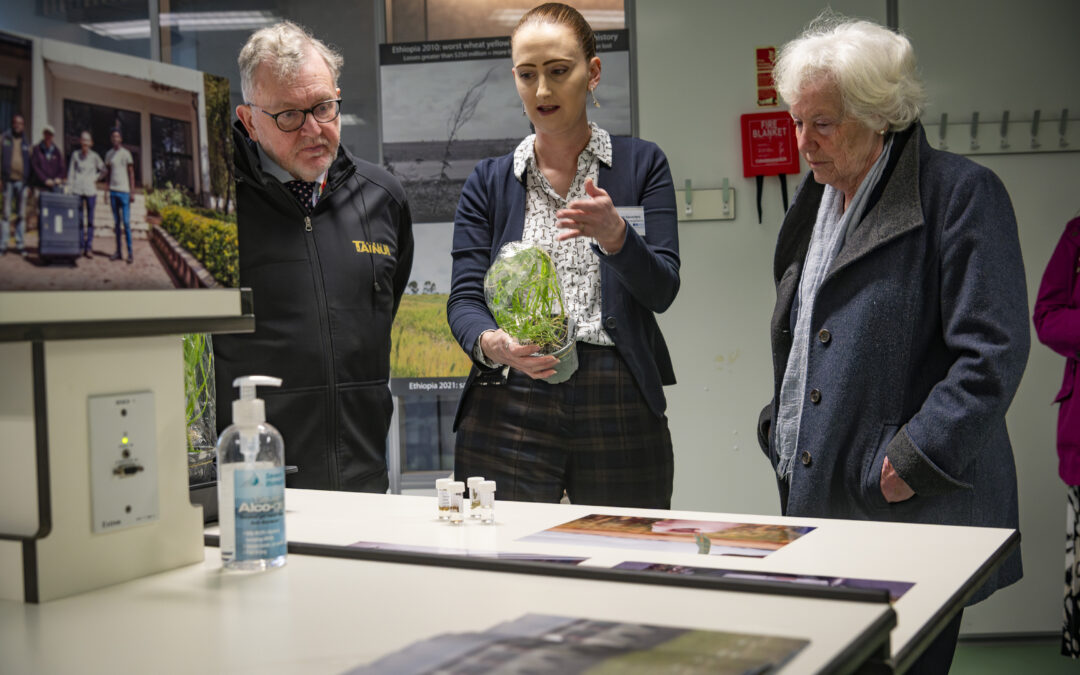One of the key objectives of the All-Party Parliamentary Group (APPG) on Nutrition for Development is to undertake cross-party Parliamentary visits to UK science and research hubs to understand examples of British innovation to address malnutrition and food insecurity, and to feed the world sustainably.
In February, the APPG’s Co-Chair, David Mundell MP, and Member, Baroness Hayman, visited John Innes Centre’s headquarters in Norwich to hear about their ground breaking work on fortified and drought resistant crops and other work to tackle global malnutrition.
Based on Norwich Research Park, the John Innes Centre is an independent, international centre of excellence in plant science, genetics, and microbiology. The Centre’s mission is to generate knowledge of plants and microbes through innovative research, apply knowledge to benefit agriculture, the environment, human health, and well-being, train scientists for the future, and engage with policy makers and the public.
During the visit, the delegation had the opportunity to meet with a number of John Innes Centre’s inspiring and dedicated academics, led by its Director, Professor Graham Moore. As well as the John Innes Centre itself, the delegation also met with academics from across Norwich Research Park who work collaboratively with the Centre. The Norwich Research Park is one of the largest single-site concentrations of research in food, genomics, and health in Europe. It has a diverse, skilled workforce of over 3,000 scientists and clinicians working at the John Innes Centre, the Earlham Institute, the Quadram Institute, The Sainsbury Laboratory, the University of East Anglia, the Norfolk & Norwich University Hospital, and across 40 businesses.
The research of the John Innes Centre and other institutes on the Norwich Research Park has huge potential to have an impact on the nutrition and development. In particular, their work addresses two key challenges: the challenge of sustainably and reliably feeding a growing global population, and the challenge of improving the nutritional value of foods to support a healthy population. Feeding the world sustainably in the face of the climate emergency is one of the biggest challenges of our time. Currently, up to 30 per cent of global crop yields are lost each year to pests and diseases, costing the world economy $540 billion annually. To tackle this issue, researchers at the John Innes Centre are investigating the molecular mechanisms behind plant interactions with pathogens, pests, and beneficial microbes. By building upon recent discoveries in plant immune systems, genomics, and advanced bioimaging, the Centre aims to support the development of improved crops which are resilient to diseases and parasites and enhance plant growth, resilience, and sustainable agricultural productivity.
The delegation heard about the work of the Biofortification Hub, hosted by Quadram Institute and the John Innes Centre, which combines expertise in soil, crop genetics, food innovation, and human health and nutrition. The Hub works closely on the biofortification of food and feed crops with farmers, food producers, and retailers across the supply chain. The Hub supports, funds, and connects academia, industry, and policymakers to collaboratively pursue shared research priorities in the area of biofortification, promoting research projects and partnerships between industry and academia as well as to support the UK biofortification community by disseminating opportunities and information in health and nutrition.
In particular, the delegation heard about work led by Professor Cathie Martin at the Biofortification Hub which is using gene editing to develop tomatoes fortified with vitamin D. This could help millions of people with vitamin D deficiency, a growing issue linked to higher risk of cancer, dementia, and many leading causes of mortality.
The delegation also heard about the work of the Norwich Institute for Sustainable Development (NISD), a world-leading institute that fosters sustainable development through transdisciplinary research and innovation, transforming research and practice to enable equitable, food secure, and sustainable futures.
In particular, the delegation heard from Dr Peter Emmrich about work on Grass Pea, an important insurance crop in regions of climate extremes, because it is resilient to drought, flooding, and saline soils; as such It is a highly valued crop for many subsistence farmers around the world, surviving the harshest conditions when all other crops fail. However, it contains a powerful neurotoxin B-ODAP which causes a permanent paralysis of the lower limbs if eaten as the primary food. Dr Emmrich’s work has identified ways to make this crop more palatable and less toxic, working closely with farmers in countries where Grass Pea is grown to ensure this life-saving crop can safely play a role in the future of agriculture.
During a tour of the Centre’s purpose-built laboratories, the delegation also heard from Professor Diane Saunders about ‘MARPLE diagnostics’ which uses DNA sequencing technology to generate high-resolution data for describing the diversity in a pathogen population directly from infected field samples. This enables scientists to track and study pathogen dispersal on a national and international scale with an aim of reducing crop losses. Up to 30 per cent of the yield of our major global crops is lost each year to pests and disease; preventing these losses would save the global economy US$ 540 billion every year.
And, finally, the delegation heard from Professor Ant Dodd at the John Innes Centre about a project in collaboration with the Quadram Institute, the University of Bristol, and industry partner LettUs Grow to develop a commercially viable method to fortify pea shoots with vitamin B12, offering a significant step forward in sustainable and efficient nutrient fortification. A deficiency in vitamin B12 can lead to a wide variety of symptoms, including tiredness, shortness of breath, and muscle weakness.
The visit demonstrated the real strength and breadth of the UK’s pioneering research and innovation into solutions for malnutrition, with British research centres producing knowledge and solutions for growers to improve food security worldwide. The visit also showcased the strength of collaboration and partnership across Norwich Research Park, highlighting the importance of Norwich as a regional science hub for research in food, genomics, and health.

